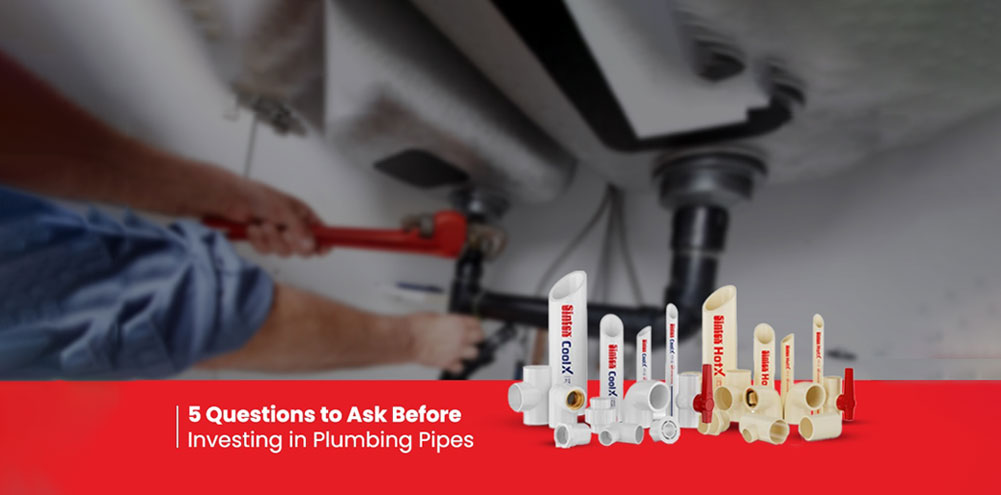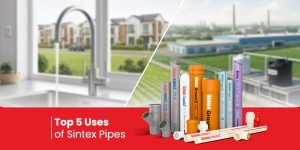5 Questions to Ask Before Investing in Plumbing Pipes
Share

Table of Contents
Are you designing a brand-new plumbing system or upgrading the existing one? Before deciding on plumbing pipes to purchase, remember that it is not only about selecting and fitting a pipe. The selection can affect water flow, durability, long-term maintenance, and the health of the house or farm.
At Sintex, we understand that you need reliable, agricultural, or commercial-grade plumbing water systems. You also deserve dependable, long-lasting pipes that, once fitted, give you complete peace of mind. To achieve this, ask the right questions before purchasing. Five questions in particular need answering before investing in plumbing pipes.
1) Is This Pipe Suitable for My Water Type?
Not all water is the same; some regions have hard water, while some have high amounts of chlorine or differing pH levels. These parameters can affect water utilities for both domestic and industrial use. The water type directly impacts how your plumbing pipes perform over time.
Knowing the difference between CPVC and UPVC pipes is helpful. CPVC pipes can endure higher temperatures and are more resistant to corrosion caused by hot water. However, UPVC pipes are more affordable and work well with cold water. Both options are suitable, but the type of water you have and your application will determine which one best fits your needs.
If chemical properties or high-pressure water are present, extra care must be taken when selecting your pipes. Never choose the most accessible option. Ensure you decide what is compatible.
2) Is It Corrosion-Resistant and Long-Lasting?
Pipes are not something you want to replace every few years. So ask yourself—how long will this last? Is it built to handle the test of time and tough conditions?
This is where high-quality types of plastic pipes, such as CPVC, UPVC, and HDPE, genuinely shine. These pipes are designed to resist rust, scaling, and biological growth. They are also non-reactive to water, lowering the chances of pipe deterioration or contamination.
When you buy pipes from reputable manufacturers such as Sintex, you are guaranteed advanced corrosion resistance alongside an excellent service life. That’s great, not just for durability but also for your overall maintenance budget.
3) Is It Easy to Install and Maintain?
We know installation matters. Whether it’s a residential or agricultural pipes and fittings system, time is money. A complicated pipe system that needs special fittings, heavy tools, or long hours of labour will only slow things down—and increase costs.
Modern types of pipes like CPVC and UPVC are lightweight, easy to cut and join, and don’t require high-tech tools. That’s a massive advantage if you want quick installation or upgrading of an older system. And maintenance? That becomes a breeze, too. No rust. No leaks. Fewer worries.
When evaluating options, don’t just look at the product itself. Ask how easily it can be installed, how often it needs checking, and how accessible the fittings are. That little insight can save you a lot of time and expense later.
4) What warranty and certifications come with it?
Let’s be honest—warranties are your safety net. If a manufacturer is confident about their product, they’ll back it with solid guarantees and certifications. So always ask—what’s the warranty? What quality standards has the pipe been tested against?
At Sintex, we don’t just talk about quality—we prove it.
Our types of plumbing pipes meet national and international standards and go through stringent quality checks. That includes pressure testing, thermal endurance, and leak resistance.
And yes, we back our products with long-term warranties because we know our pipes perform exactly how we promise. When buying pipes for long-term use, never settle for anything that doesn’t come with proper assurance.
5) Which Pipe Type Best Matches My Application?
Every project has different needs. A small home installation has different requirements than a large-scale farm irrigation system. So the real question is—not just which pipe is the best, but which is the best for you.
Understanding the various types of plumbing pipes makes this decision easier. For instance:
- CPVC pipes are great for homes and buildings’ hot and cold water systems.
- UPVC pipes work wonderfully for cold water distribution and are ideal for residential and commercial buildings.
- HDPE pipes are the most suitable choice for high-pressure water and underground systems.
- Agricultural pipes and fittings with higher flexibility and durability are important in farming.
Conclusion
Buying plumbing pipes requires careful consideration, as it entails addressing the current issue and planning to prevent future complications. These five straightforward but critical questions will guide you to manage your time, budget, and energy effectively.
Whether you’re choosing between CPVC and UPVC pipes, researching the plumbing pipes for a new building, or cross-checking items from top piping companies, don’t forget how well the pipe serves your requirements. Let’s make plumbing easy, strong, and stress-free together.
Speak with our specialists at Sintex. Let’s help make smart choices together. Do you want to begin?





